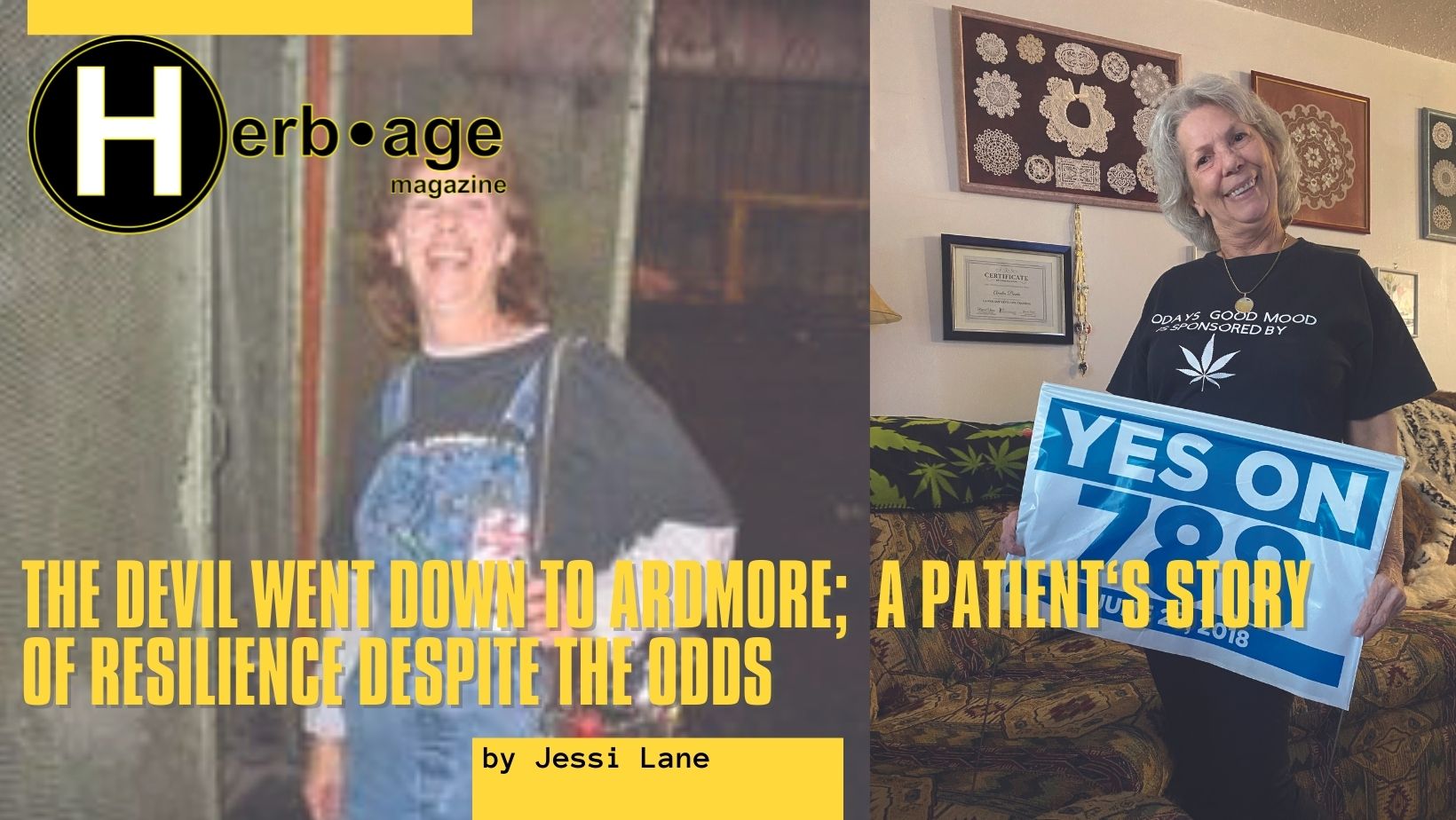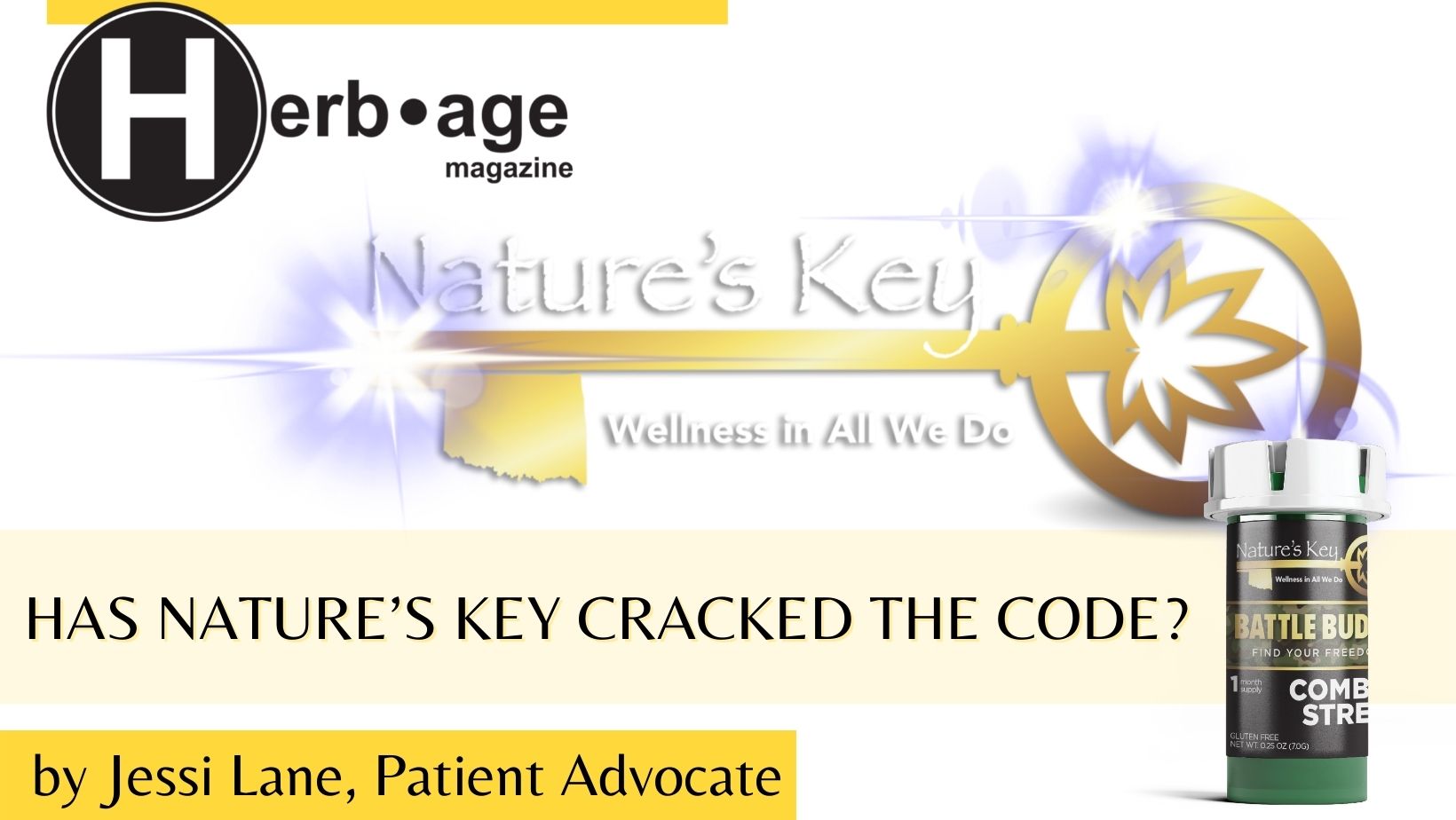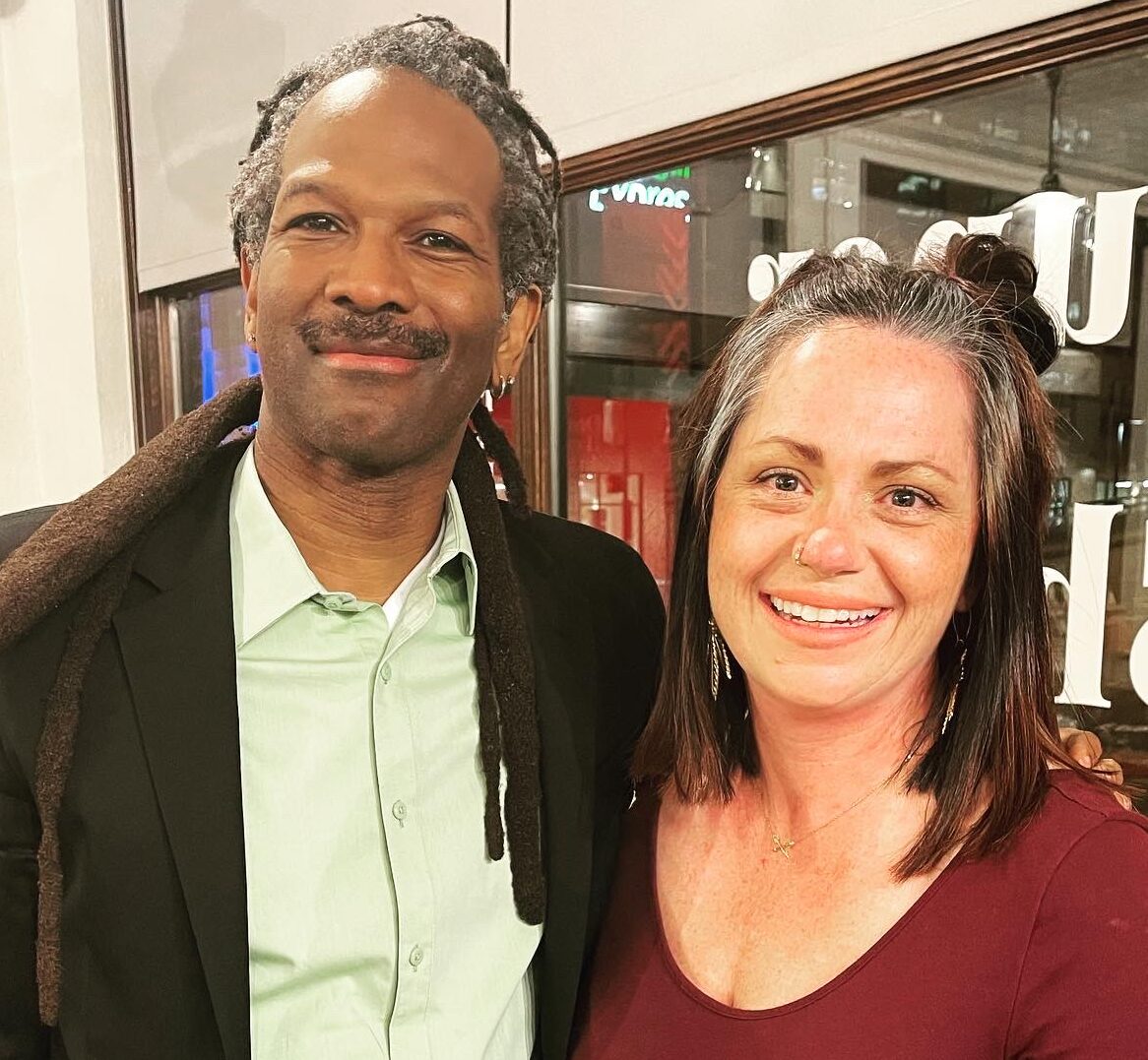The Devil Went Down to Ardmore;
a Patient’s Story of Resilience Despite the Odds
By Jessi Lane
Amelia is a compassionate woman who gives everything she’s got to the cause. She cares deeply about people and shares her cannabis as medicine knowledge with those in need. At her age she has lived more lives than 30 cats. She is a treasure, a relic. She is a beautiful piece of sea glass, smooth from years and years of waves crashing over it. The sea glass, once a discarded broken rigid fragment of something more is now acceptable, pleasing to the outside world in its color and texture. What’s that phrase? Handle everyone you meet with care because you don’t know what battles they’ve been through? No quote was more fitting than that when describing Miss Amelia, who treats her PTSD with licensed Oklahoma cannabis as medicine.

Eager to join the world of lawful cannabis distribution, something she thought she would never see in her lifetime, Amelia made her way into the Oklahoma cannabis industry via Tulsa Flowercraft’s application cattle call in 2018. Her muted self-reflection stood out among the hundreds of other (much younger) applicants. Even on paper, providing just a taste of the Encyclopedia of Cannabia that is her life experience, the hiring team knew she was a diamond in the rough. Her white hair delicately coiffed, with red framed glasses and a smile the size of Texas. Quick-witted and pleasant mannered, she also carried a bit of sorrow with her that she wears like a badge of honor- however protective of its placement. Today, Amelia has proven to have more character than most cannabis industry professionals have in their little finger. The Just Be Nice Project reminds us, “Character is developed through being tested, especially in the face of adversity and difficulty. Simply going through a tough time or being tested does not mean you develop character automatically, adherence to your principles when tested is what defines character. (1)”
The year was 1953. It was the end of the Korean War. Dwight D Eisenhower was the President of the United States. Georgia approved the first U.S. literature censorship board. The average retail price of gasoline was 29 cents. Amelia Banks was born to an Ardmore, Oklahoma family. She was a “free range child,” spending her time outside all day “running wild without supervision,” Amelia recalls. She was the 5th child born of her siblings, who dreamed of being a gymnast one day – balancing and flipping on the family clothesline. She tells us, “In my home, at the age of 18 – regardless of what time it was – we were kicked out of the house.”
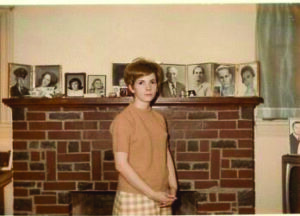
With her older siblings scattered away, at the young age of just 13 years old Amelia was the victim of rape. It was determined by a medical professional that she had become pregnant as a result of the incident. Amelia’s sister took her in, and at 7 months gestation a healthy baby boy was born. Instead of returning to her sisters after the delivery, Amelia and her baby would be forced back into the family Ardmore home. Quickly, her parents shipped her off to Cookson Hills School. According to the school’s current website, “Cookson Hills was founded on love of God and love for humanity, especially children who were hurting, abandoned, or abused.” “Where youth help themselves to Happiness (2),” or so their motto claimed at that time. Amelia’s parents kept her baby and later adopted him, forcing Amelia’s son to be known as her brother.
Amelia was then shuffled into foster care. She was placed in Tulsa at the St. John Vianney Training School for Girls, alone and without a penny to her name. During institution breaks other students went back home, but Amelia was forced to wander the Tulsa streets without food or shelter. She would dine and dash in Downtown Tulsa diners to feed herself. Then one day the fatigued and malnourished Amelia passed out cold in a Downtown parking lot. When three little girls happened upon her, their dear mother scooped Amelia up and took her back to their home, where she was recovered by St. John Vianney nuns. After receiving medical care, she was then passed along to the Carter County Sherrif’s department with whom Amelia was baselessly determined “a lesbian and needed mental help,” she relays. This was common at the time, as The Lavender Scare trickled down to affect and influence all levels of government. The Lavender Scare, known as “Eisenhower’s Executive Order 10450, [was] the investigation, interrogation and systematic removal of gay men and lesbians from the federal government,” according to Time.com. “The policy was based on the unfounded fear that gay men and lesbians ‘posed a threat to national security because they were vulnerable to blackmail and were considered to have weak moral characters.’ (3)”

It was the Summer of her 16th year, and our Amelia was forced to endure 90 days of isolation and other unspeakable hells at Griffin Memorial Hospital. But her life until now could not prepare her for her experiences while residing at her next placement – Girls Town in Tecumseh, also known as the Oklahoma State Industrial School for Incorrigible Girls. “That’s actually a reformatory. They have underground cells there,” she says. Amelia gravely recalls, “I saw people hang themselves. I saw people slit their throats.” At that time Amelia attempted suicide and learned, “you can’t OD on Benadryl, you just take a trip.” Physically, Amelia seemingly recovered from her trauma and by her 18th birthday she earned her beauty school license and GED, however this marked her release from state custody. Amelia says, “That family that found me in Tulsa? They let me stay with them.” A few months later would be Halloween weekend and Amelia would endure a sudden Hysterectomy at the young age of 18. “I’d never have another child,” she sorrowfully recounts.
Amelia moved into the Downtown Tulsa YMCA where she found herself involved in the Job Corps. It was then in the early 1970s that she was introduced to cannabis. “We smoked joints and we didn’t have all this fancy stuff,” she tells us. “We didn’t have grinders. We used our fingers.” Amelia quickly became a joint rolling aficionado and passed her time with friends in Brookside pool hauls where she found family in these friendships and was introduced to Mescaline and LSD through Vietnam Vets. “Marijuana has always been my thing,” she says. Despite it all Amelia earned her high school diploma and graduated from the Job Corps. She remembers, “people were betting on me that I wouldn’t graduate.” She then wed one of these friends. Amelia was driving a ‘71 Dodge Charger by now. Her girlfriends moved drugs, hustled, “a lot of people were drinking a lot back then,” she goes on to say. “The only reason we got married is so I wouldn’t have to testify against him.” Following witnessing a public police altercation and subsequent court appearance, Amelia and her spouse moved to Wagoner where she perfected her green thumb. She made friends with Vietnam Vets who moved Panama Red – queue Steven Stills’ “Treetop Flyer” – and learned the fine art of creating Hashish. Amelia never lost hope of reunification with her son and eventually relocated back to Ardmore to try for custody. However, upon her father’s death Amelia learned that her son – like his mother – had been shipped off to an Arkansas Christian School. She traveled to Arkansas to let him know personally that she always wanted him, a fact that had been withheld from him by her parents.

Life chugged along and Amelia, despite every odd against her, gained a divorce and climbed the ladder of Orchids Papermill, to whom she gave 26 years of her life and worked the Union ranks to become Union President. Drug Tests were not common practice yet. She tells us, “If they did [UA], nobody’d be workin’ there!” It was here that she met Vince. “He was the best companion I ever had in my life,” she wistfully recalls. Vince was a person privately struggling to live with HIV. Amelia recalls that at that time HIV patients who didn’t see their doctors were arrested but Vince couldn’t afford his appointments, meds, and rent. Amelia found she needed protection from her ex-husband, so cohabitation seemed the best option for the pair – and they were right. Vince was smoking cannabis daily – an ounce every 2 weeks – mostly to treat the side effects of the drug cocktails he’d been prescribed. “Meds at that time were extremely expensive,” Amelia recalls. They saw $900 copays for single scripts. Vince continued his employment at the papermill to keep his insurance, but he developed Wasting Disease and the pair understood his days were numbered. They enjoyed traveling across the U.S. together. “We took joints with us,” she relays with enthusiasm, “I rolled pre-rolls for a week!” Amelia says the weed they scored locally at the time was primo Acapulco Gold. They traveled to Mexico to cop his prescriptions for next to nothing when they could but by November 2, 2002, Vince said his last goodbyes to dear Amelia and under the cover of the night’s light misting rain, he passed away in their home. As his Caregiver, Amelia compassionately cared for his every personal need for 8 and a half years. “He gave me a reason to live,” she sobs. “Nobody can tell you how to live like a person who’s dying.”
This relationship with Vince impacted Amelia’s life more than any other crossing of souls throughout her time. After this impenetrable loss, Amelia relocated to Virginia by way of a budding AOL chat relationship. These were the dial-up days. “Dead Heads know where all the good drugs are,” she jokes. Securing her VA plug through a Dead Head called Daniel, they enjoyed marijuana and acid together, taking in the sights of Richmond, VA. “The weed in Virginia was about $180 an ounce,” she recalls, “and you got what you got.” Amelia enrolled in Tidewater Tech where she received her Associates of Occupational Science degree in Medical Administration Management. In 2007 she moved back to reunite with her son, who had been incarcerated. Amelia took several back-to-back jobs including the now-closed Gatorade plant, “I have passed many UAs after smoking that morning,” Amelia boasts, “I was good at it.” She went on to work for the National Census Bureau, Bama, Kimberly-Clark, and Nordam, where she says that lots of employees privately consumed cannabis. Amelia retired from manufacturing as the time was finally approaching for these skilled workers to come out of their canna-closets. In 2018 The Oklahoma 788 vote to legalize cannabis as medicine passed with 57% of the votes. Amelia sought the care of Dr. Brandon Bailey, who issued Amelia’s medical recommendation to treat her PTSD with cannabis as medicine, thus qualifying our heroine to obtain her OMMA license. She chooses to layer her daily consumption methods using tinctures, gummies and combustible flower.
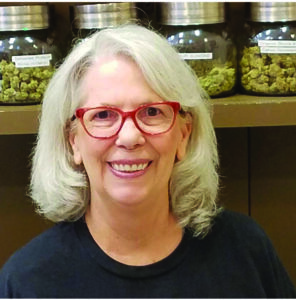
Amelia has since obtained her Cannacian I and II certifications, serving Tulsa area patients as a Patient Advocate, bridging the gap for Oklahoma patients embarking on their own cannabis as medicine journey by offering her compassionate care to everyone she meets. But don’t be mistaken by those warm hugs as she’ll be the first to tell you among her siblings, “I’m the mean one,” she goes on to say, “I’ve always been the mean one because I’ve always had to fight.”
Jessi Lane, Patient Advocate is a Writer and Oklahoma Cannabis Industry Professional since 2018. She is a Certified Cannacian III and Trichome Institute Certified Cannabis Consultant with a “full spectrum” Postpartum Wellness background.
Works Cited
- “What Does It Mean to Have Character?” JUST BE NICE PROJECT, 13 Mar. 2018, https://www.jbnproject.com/news/what-does-it-mean-to-have-character.
- “Cookson Hills History 1950s – 1960s.” Cookson Hills, 22 Dec. 2017, https://cooksonhills.org/stories/history1950s-1960s/.
- Haynes, Suyin. “History You Didn’t Learn About the Anti-Gay Lavender Scare.” Time, Time, 22 Dec. 2020, https://time.com/5922679/lavender-scare-history/.

